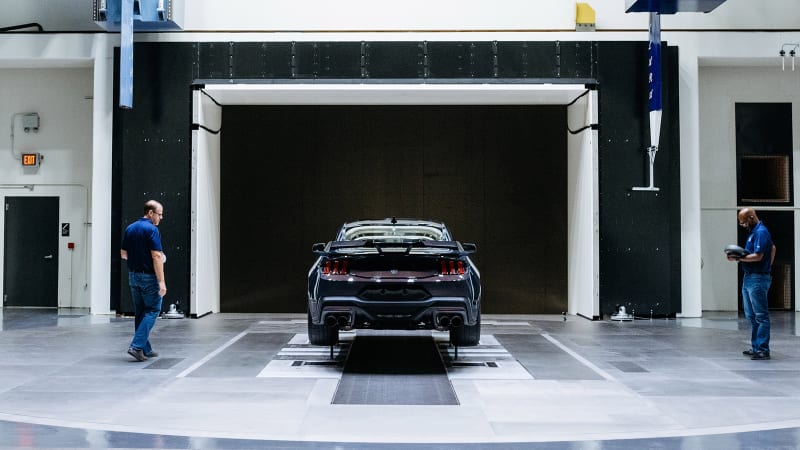Besides offering 500 horsepower, the 2024 Ford Mustang Dark Horse has some nifty aerodynamic tricks thanks to some extra time in the wind tunnel that some of its predecessors didn’t get (see the story, here). That wind tunnel, is also pretty darn neat, and we got an opportunity to see it in person, and we’ll bring you along to see it.
The headline statistic (literally) is the fact it can simulate speeds of up to 200 mph. Ford claims this is the first rolling road wind tunnel for cars that can do it. For that specific speed, there’s one large belt the vehicle is placed on, which is spun up to match the wind speeds. This allows aerodynamicists to get more accurate data on how the car reacts at those speeds, since turning wheels and tires play a major role. But when those very high speeds aren’t needed, say, for testing more mainstream passenger cars, rather than sports and race cars, there’s a five-belt treadmill with four smaller belts for each wheel, and a center one to simulate the effects of the road passing under the car. To switch out these belts, there is an enormous crane that lifts them out and drops them in. Such a crane is needed as the five-belt setup weighs around 70,000 pounds, and the single-belt is around 90,000.
The belts themselves are neat, too. They’re very thin at 0.8 mm thick, which is enough to be durable, but also light. And the belts are supported by a cushion of air, which makes them easy to rotate and keeps wear down. Those belts turn the wheels of the vehicle, too, rather than the vehicle being turned on and run to speeds. This avoids high temperatures, sound and exhaust.
Of course a wind tunnel needs a way to generate wind, and that’s done by a massive fan. The fan sits in its own tunnel, and is connected to the vehicle area via ducts that create one big loop. The fan also measures more than 26 feet in diameter and has blades made of carbon fiber. The wind tunnel supervisor who was on hand to tell us about the tunnel, John Toth, said it’s rated at 7,100 horsepower and can move 5 million cubic feet of air per minute. Apparently that’s enough to fill something like the Goodyear blimp in 6 seconds.

Back to the platform with the belts, it’s movable. It can be rotated up to 30 degrees left or right in order to test for cross winds or for aerodynamics when cornering. That’s cool in and of itself, but what’s also amazing is the tight gap between the turntable and the rest of the floor. There’s just 1.5 mm of space in order to keep the gap tight enough that it won’t have a major impact on testing. Changes in temperature could cause the nickel-plated steel to expand enough to keep it from turning.
That’s one of a couple reasons that the air tunnel is very carefully temperature controlled, at 72 degrees Fahrenheit to be specific. The other reason is Toth and other aerodynamicists want to keep everything else about testing consistent. He mentioned that accuracy and repeatability with the tunnel are within 0.2 pounds of force.
Read the full article here


